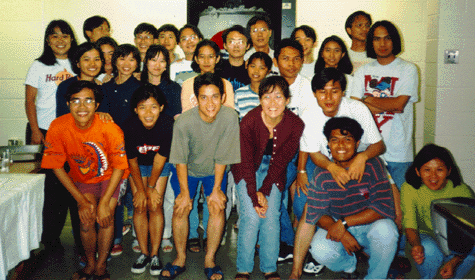
The 27 participants attended classes especially designed by academic coordinator June Quigley, who also instructed along with Leslie Criston and Debra Stolz. Cross-cultural appreciation was an integral part of the coursework, since these executives will meet again while working for DuPont. Participants also attended a special e-mail lab run by summer faculty member Alicia Duchak, and enjoyed weekly visits to various DuPont facilities, where they interacted with their American counterparts. Mary Elaine Huffman, a former DuPont employee, provided support by matching DAPYL participants with American host families, many of whom were also DuPont employees.
THAI PREACADEMIC PROGRAM PARTICIPANTS AND FRIENDS GATHERED AT A FAREWELL PARTY LAST SUMMER.
A FEW MEMBERS OF THE HANKUK GROUP ARE SHOWN IN FRONT OF THE VIETNAM MEMORIAL IN WASHINGTON, D.C. IN JANUARY
The mild winter weather looked favorably on the students this year, allowing them to enjoy many interesting activities, including basketball and volleyball intramural sports, visits to the Philadelphia Orchestra, New York City, Blue Mountain Ski Area, Baltimore Inner Harbor, and Washington D.C., and seeing a professional basketball game with their host families.
Students fulfilled the academic aspect of the program by participating in ELI classes such as General English, the Film Class, Music Class, and the Culture class.
While on Graduation night many students were heard saying they weren't ready to leave, on February 11, 24 students said good-bye and boarded a plane to spend their remaining time in California and Hawaii. Five students stayed in Newark to complete the eight-week ELI session, and one of those students, Soo Young Lee, entered the University the following semester.
DR SCOTT STEVENS (LEFT) JOINED ACADEMIC COORDINATOR MICHELLE KLINE (THIRD FROM RIGHT) AT THE SIBI GRADUATION CEREMONY.
Most of the students in this year's SIBI, organized
by academic coordinator
Michelle Kline, were already enrolled in ELI. This close-knit group visited
several local corporations, starting on the first day with a tour of the Port
of Wilmington. Here the students encountered many products imported from their
own countries. Later, the class visited a Saturn dealership, the Philadelphia
Stock Exchange, and W. L. Gore, as well as other corporations.
Besides these visits, the students attended informative seminars, including two given by professors from the College of Business and Economics at the University of Delaware, and others by professionals from DuPont, Dean Witter, and the Delaware Development Center.
The African teachers ended their stay in the U.S. with a week in Washington,
D.C., and then returned to their countries bringing much to share: not only
gifts, photographs, and many stories, but also knowledge to share with their
colleagues as they continue to work toward the betterment of EFL instruction
and administration.SIEFL
This summer, ELI once again had the pleasure of offering the third Summer
Institute for English as a Foreign Language Educators from Francophone and
Lusophone Africa (SIEFL), funded by the United States Information Agency. This
year's 26 participants, coming from 15 African countries, impressed seminar
presenters and program coordinators alike with their extensive academic
backgrounds, exceptional dedication and enthusiasm for the work of teaching
English as a Foreign Language. Following an exhaustive (and exhausting!)
program of seminars and cultural activities set up by academic coordinator
Grant Wolf, the participants organized and presented an impressive Mini-TESOL
Conference, at which they showcased the knowledge and skills they had acquired
during the five-week on-campus program. The Conference culminated in what is
now an ELI tradition, Africa Night, featuring authentic African music, dancing,
fashions, and of course, African cooking!